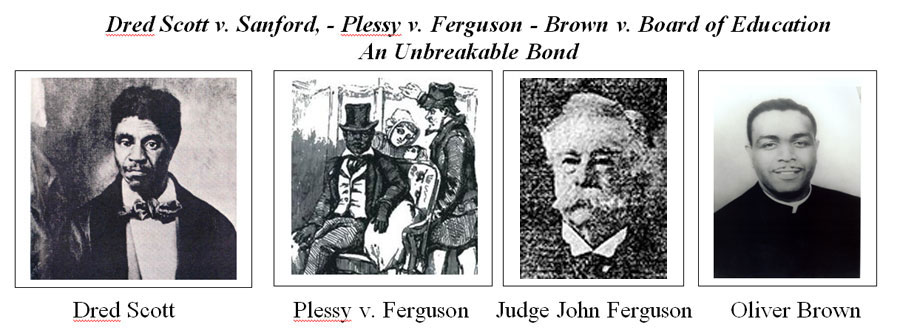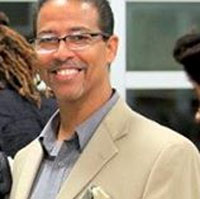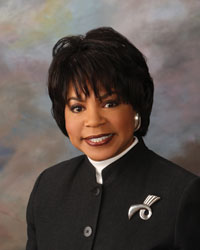Brown & Associates
Brown & Associates' Signature Program Offers an Unparalleled Presentation

Seldom does one have the opportunity to hear from descendants of people involved in the type of historic change that continues to resonate and impact our daily lives as citizens of the United States - ultimately influencing human rights struggles around the world. Our signature program brings together descendants of Dred Scott, Homer Plessy, Judge John Ferguson and Oliver Brown, for one memorable program. The Landmark U.S. Supreme Court decisions in Dred Scott v. Sanford, Plessy v. Ferguson and Brown v. the Board of Education represent an historic continuum and are inextricably linked.
Remembrance and reconciliation is the theme of this intriguing program. Lynne Jackson, Keith Plessy, Phoebe Ferguson and Cheryl Brown Henderson recount their families’ history and involvement in the legal cases that led to these landmark U.S. Supreme Court decisions.
 Lynne Jackson
Lynne Jackson
In 1857, the U.S. Supreme Court, in Dred Scott v. Sanford, ruled that African Americans, as enslaved persons, were excluded from citizenship and where without constitutional protection. In spite of the ruling territorial governments continued to debate the issue of slavery and citizenship for African Americans. The Dred Scott decision became a major catalyst for the Civil War. Dred Scott and his wife, Harriet, by suing for their freedom were civil rights pioneers. In little more than a decade after the Decision, with the end of the Civil War our nation ratified three Constitutional Amendments which abolished slavery, granted equal citizenship to African-Americans, and guaranteed the right to vote regardless of race or color. The courage and sacrifice of Dred and Harriet Scott and their family played no small part in achieving this monumental victory.
Lynne M. Jackson is a great-great granddaughter of Dred Scott, and founder and president of the Dred Scott Heritage Foundation. She holds a Bachelor of Science: Business Administration and Marketing, Southern Illinois University. Ms. Jackson She has travels across the United States sharing the story of her ancestors, their case, and what it means to the future of this nation.
 Keith Plessy
Keith Plessy
In 1960 while a student at Valena C. Jones Elementary School in New Orleans, Louisiana, Keith Plessy discovered he had a famous last name. His family legacy was that of the landmark U.S. Supreme Court decision in Plessy v. Ferguson, resulting in nearly 60 years of the doctrine of “Separate but Equal”, segregating people based on race. Homer Plessy, the plaintiff in this landmark ruling was the first cousin of Keith Plessy’s great grandfather. Keith is a longtime bellman at The Marriott hotel. He is a native of New Orleans and a graduate of John McDonogh High School and NOCCA - the New Orleans Center for Creative Arts. A gifted artist, he was invited to return to Valena C. Jones elementary school in 1979 to paint more than a hundred portraits of civil rights leaders on the interior walls of the school, His paintings are still there today. Currently, as president of the Plessy and Ferguson Foundation, Keith continues to share the story of his family’s civil rights legacy.
 Phoebe Ferguson
Phoebe Ferguson
Phoebe Ferguson is the great-granddaughter of Judge John Howard Ferguson. Judge Ferguson served on the Orleans Parish Criminal Court and ruled against Homer Plessy for taking a seat in a train car designated for “white’s only”, in defiance of laws that segregated people base on race. Upon appeal to the U.S. Supreme Court the case became known as Plessy v. Ferguson resulting in the 1896 ruling creating the doctrine of “Separate but Equal”.
A New Orleans native, she worked as a successful photographer and filmmaker in New York City for 20 years, before returning home. Right after Katrina, she drove a truck full of supplies from Brooklyn, New York, to the families who lost everything during the storm. Eight months later, she moved back to her roots to finish her documentary, Member of the Club, and start a new life as co-founder of The Plessy and Ferguson Foundation. Through the Foundation she works to ensure equity in education and to develop programs that combine history and the arts. Ms. Ferguson holds degrees from Art Center College of Design and New York University.
 Cheryl Brown Henderson
Cheryl Brown Henderson
The 1954, U.S. Supreme Court decision in Brown v. the Board of Education dismantled the legal framework for any type of discrimination and overturned the 1896 decision in Plessy v. Ferguson and its doctrine of “Separate but Equal” as it related to public education. The 1964 Civil Rights Act was possible because the court in Brown struck down the legitimacy of laws that segregated people and treated them differently based on race. Later that same legal measure was applied to women’s rights, citizens with disabilities, older adults and other forms of discrimination. The legal name of the 1954 Supreme Court decision is Oliver L. Brown et. al. vs. the Board of Education of Topeka (KS), et. al. Cheryl Brown Henderson, one of the children of Oliver Brown, continues to speak about the experiences of the families who stood with the NAACP as plaintiffs and share the stories of the community organizers and attorneys who orchestrated this legal challenge to racial segregation.
She is the founder of the Brown Foundation and in 1990 worked with Congress on legislation to establish a national park to interpret Brown v. Board of Education and in 2001 worked with Congress to create a federal commission for the 50th anniversary of the Brown decision.
She holds degrees from three Kansas Universities, a Bachelor’s degree in Elementary Education, minor in math from Baker University, a Master’s Degree in Guidance from Emporia State University and Counseling, and an honorary Doctorate of Humane Letters from Washburn University.



















